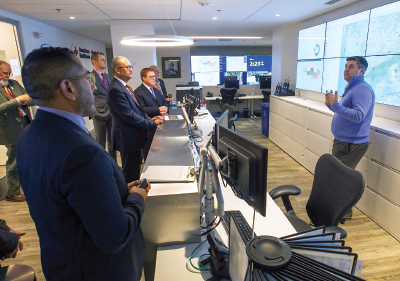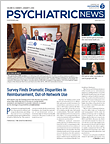The American Psychiatric Association (APA) Foundation donated a total of $30,000 to the American Red Cross (ARC) last month for disaster relief efforts in mainland United States and Puerto Rico.
Of that amount, $20,000 was earmarked for relief for recent disasters, including hurricanes Harvey, Irma, and Maria and the California wildfires; $10,000 was earmarked specifically for Hurricane Maria relief. The remaining amount raised—$3,000—is being donated to CrearConSalud, a newly formed nonprofit created by a group of Puerto Rican psychiatrists living in the United States. The group has made a series of trips to Puerto Rico since 2015, assessing community and mental health needs and organizing educational activities on the island.
The funds were donated by APA members and staff to the APA Foundation’s Disaster Relief Fund and matched by the APA Foundation. Among those who donated were members of the APA Assembly, which held a special fund-raising event at its November meeting.
The check presentation was held at the ARC’s national headquarters in Fairfax, Va. Participants included APA CEO and Medical Director Saul Levin, M.D., M.P.A.; APA Foundation Executive Director Daniel Gillison; Linda Mathes, CEO of the National Capital Region of the ARC; and Joshua Morganstein, M.D., a member of APA’s Committee on Psychiatric Dimensions of Disasters.
The funds will help support the ARC’s mental health volunteer program, made up of 3,500 licensed professionals, including psychiatrists, social workers, counselors, marriage and family therapists, psychiatric nurses, psychologists, school counselors, and school psychologists, all of whom are trained in disaster mental health interventions.
ARC program leaders, including Valerie Cole, Ph.D., who manages Disaster Health Services and Disaster Mental Health at ARC, explained during a presentation that followed the check-presentation ceremony that ARC’s mental health services operate on the assumption that most people are resilient; however, a significant minority may be at risk of developing new or aggravated psychological disorders after a disaster.
Responders provide disaster mental health interventions focused on basic care, support, and comfort for individuals experiencing disaster-related stress. Cole noted that volunteer services are meant to augment the community’s mental health resources, not replace them.
In a year marked by historic hurricanes, wildfires, and other crises, the ARC deployed more than 56,000 disaster workers (92 percent of whom were volunteers) and facilitated twice as many overnight shelter stays than in the past four years combined. Workers provided 13.6 million meals; 7 million relief items such as bottled water, flashlights, and tarps; 267,000 health and mental health contacts; and financial recovery assistance for 624,000 households. Of each dollar donated to the ARC, 91 cents is spent directly on humanitarian services and programs, according to the ARC.
Geoff DeLizzio, ARC’s chief development officer, took APA attendees on a tour of the ARC’s Disaster Operations Center, the ARC’s “nerve center” where ARC staff and volunteers map and monitor analytics for disasters as they occur and “pre-position” millions of supplies such as food, water, and cots for future events. In 2017 alone, ARC provided 76,000 households with recovery support after home fires and made 401,000 “home safety” visits to prevent future fires.
After the tour, APA and ARC leaders gathered for discussion. APA representatives commented on the ongoing mental health challenges in areas like Puerto Rico and California wildfire zones where recovery has been slow.
In addition to raising money to support humanitarian efforts, Brad Kieserman, ARC’s vice president of disaster operations and logistics, said, “We rely on the philanthropy of time. Demand for mental health care in particular often outstrips available resources.” ■
Information for psychiatrists interested in becoming an ARC volunteer can be accessed
here.


